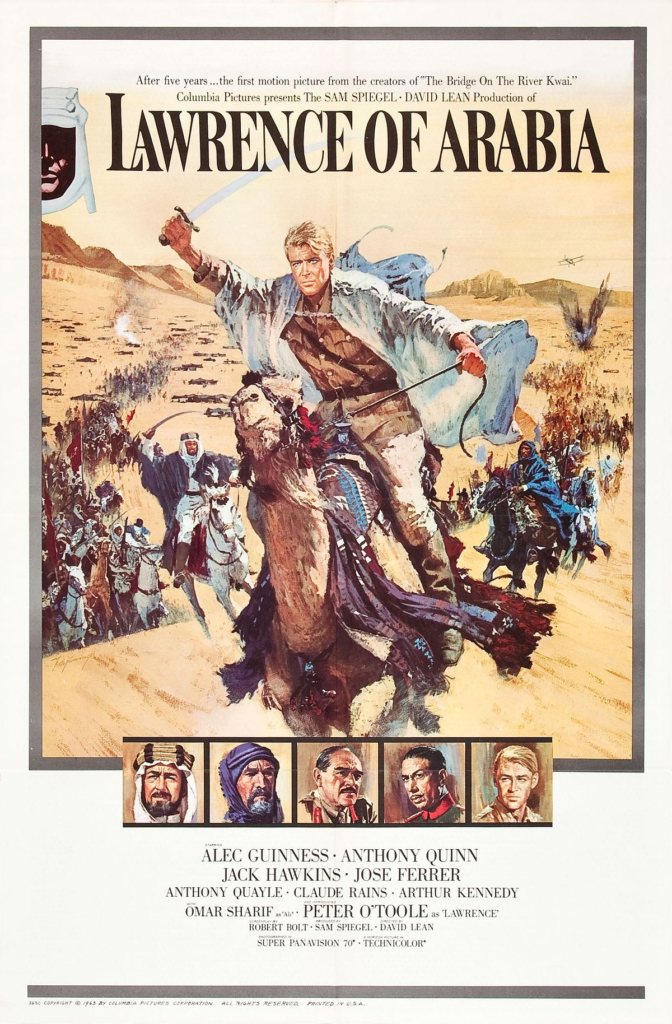Lawrence of Arabia Christian Review

Lawrence of Arabia is a cinematic masterpiece that you don’t just watch—you experience. A film that leaves you staring at the screen long after it ends, not just because of its grandeur, but because of its deep, unsettling exploration of human nature. It’s not the kind of film you easily summarize or categorize. It’s an epic, but not just in terms of scale. It digs into themes like ambition, identity, and sacrifice in a way that demands you sit with it, turning over what it has to say. As a Christian viewer, it leaves even more to chew on, especially when it comes to leadership, pride, and how they play out in one’s purpose.
The Man and His Mission
Let’s start with T.E. Lawrence himself. If you’re looking for a straightforward hero, this isn’t your guy. Played with incredible complexity by Peter O’Toole, Lawrence is an enigma. He’s driven by a genuine desire to make a difference, to unite the Arab tribes against the Ottoman Turks during World War I. On the surface, he looks like the kind of leader you’d want in the trenches with you—someone who’s not afraid to get his hands dirty, someone who can inspire loyalty and action. But scratch the surface, and you quickly realize Lawrence’s mission is as much about his own inner turmoil as it is about freeing anyone from oppression.
There’s something off-kilter about his pursuit of greatness. He’s caught between a desire to serve and a craving for personal glory. This is where the film gets interesting from a Christian perspective. The Bible doesn’t shy away from stories about flawed leaders. Think of King Saul, whose early potential was marred by pride and disobedience. Lawrence is no Saul, but he shares the same fatal flaw: pride. The thing that makes him a brilliant leader—his absolute belief in his own vision—is also the thing that nearly destroys him. It’s a classic warning sign, one Christians know all too well: “Pride goes before destruction” (Proverbs 16:18).
In the desert, Lawrence discovers the fine line between confidence and arrogance. He’s convinced that he’s the only one who can unite the Arabs, the only one who can do what needs to be done. At first, that confidence is inspiring. The Arabs rally around him, and he achieves victories no one thought possible. But as his success grows, so does his ego. He begins to see himself not just as a man on a mission, but as something more—a figure of destiny, even a godlike presence in the desert. It’s the kind of hubris that rarely ends well.
The Desert as a Testing Ground
The desert in Lawrence of Arabia isn’t just a backdrop. It’s a crucible. For Lawrence, it’s a place of testing, almost like a wilderness of the soul. If you think back to the Bible, the wilderness is where people are tested, where they come face to face with their true selves. Jesus Himself was led into the desert to be tempted (Matthew 4:1-11), and it’s no coincidence that the most intense moments of personal struggle in the Bible often happen in these harsh, empty spaces.
In the vast, scorching expanse of the desert, Lawrence has to confront who he really is. Is he a British officer, loyal to the empire? Or is he something else—something greater, perhaps? The film doesn’t give easy answers because Lawrence himself doesn’t know. He’s caught between two worlds—Western colonial power and the Arab tribes he claims to serve—and it’s not clear where his true allegiance lies. As Christians, we understand this tension. We live in the world but are not of it (John 17:14-16), constantly navigating the line between where we are and where we’re ultimately meant to be.
What’s so striking about the desert scenes is how much they reflect that inner battle. Lawrence is literally wandering in a place of desolation, trying to figure out his purpose, and the desert becomes a mirror for his own spiritual desolation. It’s both exhilarating and terrifying to watch. The desert strips away everything, leaving Lawrence to grapple with his deepest fears and desires. In that sense, it’s not just a physical landscape, but a spiritual one—a place where Lawrence’s soul is laid bare.
The Complexities of Leadership
Leadership is one of those topics that never really goes out of style, and Lawrence of Arabia has a lot to say about it—though not always in the ways we’d expect. If you were to make a list of qualities that make a good leader, Lawrence might tick a lot of the boxes: he’s brave, visionary, and willing to take risks. But as the film shows, those qualities aren’t enough. Lawrence’s leadership is compromised by his inability to see past his own ego. He’s not leading for the sake of others; he’s leading for the sake of his own legacy.
This is where Christian ideas of leadership really come into play. In the Gospels, Jesus teaches a radically different form of leadership. In Matthew 20:26-28, He says, “Whoever wants to become great among you must be your servant, and whoever wants to be first must be your slave—just as the Son of Man did not come to be served, but to serve.” It’s a striking contrast to Lawrence, who, at his worst moments, is more concerned with being remembered than with truly serving the people he’s leading.
As Christians, we’re called to a model of leadership that looks very different from what Lawrence embodies. It’s a leadership rooted in humility, not hubris; in service, not self-promotion. Lawrence’s journey shows the dangers of losing sight of that. His leadership becomes less about helping the Arab tribes and more about cementing his place in history. It’s a trap any leader can fall into, and it’s a cautionary tale for anyone who aspires to greatness.
The Search for Meaning
One of the most profound themes in Lawrence of Arabia is the search for meaning. Lawrence is not just fighting a war; he’s fighting to understand himself. What’s driving him? Is it a desire to help the Arabs, or is it something more self-serving? By the end of the film, it’s clear that Lawrence himself doesn’t fully know. He’s caught in a struggle to find meaning in his life, to figure out what he’s supposed to be doing.
For Christians, this theme hits home in a big way. We believe that our ultimate purpose is found in Christ. Ephesians 2:10 reminds us that “we are God’s handiwork, created in Christ Jesus to do good works, which God prepared in advance for us to do.” Lawrence’s search for meaning is poignant, but it’s also deeply tragic because he’s looking for purpose in the wrong places. He’s looking to himself, to his accomplishments, and to his legacy. And that’s why, by the end of the film, he feels so lost.
What Lawrence’s story illustrates so powerfully is the danger of finding your identity in anything other than God. He’s constantly searching, constantly striving, but it’s never enough. His achievements, as impressive as they are, leave him feeling empty. It’s a reminder to all of us that true purpose and fulfillment come not from what we do, but from who we are in Christ.
The Cost of Glory
There’s a high cost to glory, and Lawrence of Arabia doesn’t shy away from showing that. Lawrence achieves incredible things—he unites the Arab tribes, leads them to victory, and becomes a legend. But by the end of the film, he’s a broken man. His victories have come at a tremendous personal cost, and you can’t help but wonder if it was all worth it. His story is a stark reminder that pursuing greatness for its own sake often leads to disillusionment and despair.
In the Christian life, we’re called to count the cost of following Christ (Luke 14:28). We know that true greatness doesn’t come from worldly achievements, but from living a life of service and humility. Lawrence’s story is a powerful example of what happens when we lose sight of that. He becomes a legend, but at what cost? By the end, his glory feels hollow, his achievements tainted by the personal sacrifices he wasn’t prepared to make.
Final Thoughts
Lawrence of Arabia is an epic film in every sense of the word. It’s visually stunning, emotionally complex, and filled with rich, thought-provoking themes that resonate on a spiritual level. For Christian viewers, it’s a story that raises important questions about pride, leadership, and purpose. It’s a reminder that true greatness isn’t found in the sands of this world, but in a life lived for something greater than ourselves.
Rating: 9/10
This film stands as a masterpiece of cinema, but also as a cautionary tale for anyone seeking to understand the complexities of leadership and purpose. It’s a film that leaves you thinking long after the credits roll, and for that, it deserves its place among the greatest films ever made.




